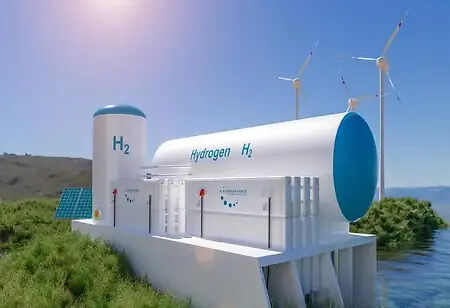
Does Green Fuel Hydrogen Worsen Climate Change?


A colorless, odorless, flammable gaseous chemical substance, Hydrogen (H2) with three isotopes makes up only about 0.14 percent of the earth’s crust by weight. H2 is transparent to visible light, infrared light, ultraviolet light, and wavelengths below 1800 Å. Scientists have always postulated that it holds a great promise to clean energy as a fossil fuel. Virtually it is inexhaustible; its combustion produces only water with zero emissions.
Hydrogen is normally known as a clean fuel. Burn hydrogen in a turbine, and it will generate power without carbon dioxide. When run through a fuel cell, it will produce electricity with water vapor as the only exhaust. Unlike solar and wind power, it can be stored in large amounts. Besides, the majority of the hydrogen produced today is stripped from natural gas in a process that releases carbon dioxide. It can also be separated from water using renewable power, with no emissions but oxygen.
Now the whole world is worried about the usage of hydrogen, seeing it as a way to power factories, buildings, ships, and planes without pumping carbon dioxide into the sky. Depending on how the hydrogen container is handled during transportation, a slight leakage could immediately pose a danger, eventually polluting the atmosphere. Any future hydrogen-based economy must be designed from the start to keep gas leaks to a minimum, or it risks adding to the very problem it’s supposed to solve. Some new experiments are tested again, like shipping hydrogen in pipelines built to hold natural gas or burning it in individual homes could cause unacceptable leaks.
In the case of blue hydrogen, the leakage of the methane used to produce it is considered its main drawback. Except the color of H2, hydrogen leaks themselves are the biggest threat to its expansion as an energy source. As with the hydrogen budget, Bryant stresses that the extent of leakage is still unknown and subject to estimation.
David Stevenson, an atmospheric chemist at the University of Edinburgh, says, “If leakage rates are high, or the H2 economy becomes very large, they may become important.”
Mike Fowler, director of advanced energy technology research at the Clean Air Task Force (CATF), a US environmental organization, explains that researchers who have looked into the matter have drawn parallels between hydrogen and methane, saying the two gasses have similar tendencies to leak from pipes and other equipment.
Ilissa Ocko, a climate scientist with the Environmental Defense Fund, says, “The potency is a lot stronger than people realize. We’re putting this on everyone’s radar now not to say no to hydrogen but to think about how we deploy it.”
Hydrogen doesn’t trap heat directly the way CO₂ does. Instead, when leaked, it sets off a series of chemical reactions that warm the air and acts as an indirect greenhouse gas. And though it cycles out of the atmosphere far faster than carbon dioxide, which lingers for centuries, it can do more damage than CO₂ in the short term. Over 20 years, it has had 33 times the global warming potential of an equal amount of carbon dioxide, according to a recent UK government report. For hundreds of years, carbon has been more dangerous due to its durability.
The features of hydrogen getting warm was not a problem before as its use was largely limited to oil refineries and chemical or fertilizer plants. But now, governments worldwide are investing billions in building a hydrogen economy, seeing gas as one of the only options for decarbonizing many industries that can’t easily run on electricity. U S President Joe Biden has set aside eight billion to build at least four hydrogen hubs where the fuel will be produced and used, and states are gearing up to compete. US utility companies that now deliver natural gas see it as a savior, announcing more than two dozen hydrogen pilot projects in the last two years.
Major Applications of Hydrogen
Many utility companies are experimenting with blending hydrogen into their existing natural gas pipelines, sprawling networks that feed everything from power plants to household stoves. To Hamburg, that’s a recipe for leaks. He also warns that mass-producing hydrogen from fossil fuels could even lead to a short-term increase in global warming if the systems for making and transporting the hydrogen leak enough hydrogen and methane. There would still be a long-term benefit from cutting carbon dioxide emissions. Still, over a decade or two, a leaky hydrogen system based on fossil fuels could cause more warming than business as usual.
H2 plays a catalytic role in the hydrogenation of organic compounds. Unsaturated vegetable and animal oils and fats are hydrogenated to make margarine and vegetable shortening. Hydrogen acts as a catalyst to reduce aldehydes, fatty acids, and esters to the corresponding alcohols. Aromatic compounds can be reduced to the corresponding saturated compounds, as in the conversion of benzene to cyclohexane and of phenol to cyclohexanol, and the Nitro compounds can be reduced easily to amines.
Hydrogen has been used as the primary rocket fuel for combustion with oxygen or fluorine and is favored as a propellant for nuclear-powered rockets and space vehicles. Besides, hydrogen is used to directly reduce iron ores to metallic iron and reduce the oxides of tungsten and molybdenum to the metals. A hydrogen atmosphere is employed in the pouring of special castings, the manufacture of magnesium, the annealing of metals, and the cooling of large electric motors. Hydrogen was once used for inflating lighter-than-air vessels, such as dirigibles and balloons, but now helium is generally used for the purpose because it is nonflammable. The barrage balloons used in England during World War II, however, were filled with hydrogen. Liquid hydrogen is used in the laboratory to produce low temperatures.